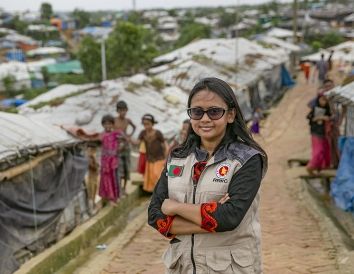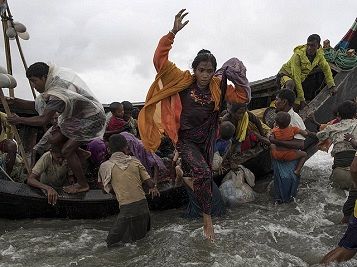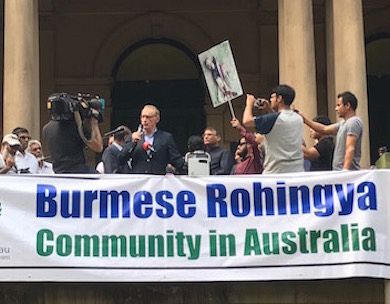The Rohingya have received little international support and that must change to ensure their rights are respected and protected, writes Shaik Abdur Rahman.
AFTER THREE WAVES of COVID-19, a coup and an unprecedented spurt of violence in Myanmar, the International Court of Justice (ICJ) has recently proceeded with the groundwork for the prosecution of the Myanmar military.
Last month, the ICJ held public hearings into the list of preliminary objections raised by Myanmar, mostly with the issue of the Court’s jurisdiction and admissibility of Gambia’s application. The Court wrapped up the hearings by 28 February.
However, even if Myanmar's objections are refuted and the case does proceed, it would take several years to reach a final ruling.
On 11 November 2021, The Gambia v Myanmar lawsuit was filed by the Gambia, backed by the Organisation of Islamic Cooperation, against Myanmar for violating provisions of the 1948 Genocide Convention.
Although ICJ hasn’t made any ruling yet on whether any genocide has occurred or not, in its hearing of 2020, it asserted its ‘prima facie jurisdiction’ over the case as it involves potential violations, concurring the 2018 UNHRC mandated International Fact-Finding Mission (IFFM) report.
Defining the Rohingya as a “protected group” under the Genocide Convention, ICJ imposed on Myanmar four specific “provisional measures” to prevent the risk or probable recurrence of genocide and preserve the evidence of the 2017 attacks. So far, the junta regime is blatantly infringing the ICJ’s provisional measures and its hearings.
For instance, on 25 November 2021, the Tatmadaw (that is, Myanmar's military government) issued an order of making “form 4” mandatory for the Rohingyas, reinforcing the long-standing restrictions on Rohingya’s freedom of movement and impacting other components of Rohingya's basic survival such as health, education, and livelihoods.
Likewise, by coercing mass displacement and blocking humanitarian aid for the vulnerable, the Junta has exacerbated a self-inflicted humanitarian catastrophe which, specifically, indicates the Tatmadaw’s intent to destroy the group in whole or in part.
Signs of progressive change in ‘Rohingya narrative’
Much, however, has changed since the reversal of Myanmar's decade-long democratic transition on 1 February 2021. Following the coup, the Tatmadaw, who committed atrocities against the Rohingya, is now perpetuating those crimes against the Bamar majority and other ethnic groups.
Realizing the common enemy is the military, Burmese people’s attitude towards ethnic Rohingya Muslims is gradually changing. The civil disobedience movement and the shadow government, the National Unity Government (NUG) have introduced a new chapter in Myanmar's understanding of democracy, one which celebrates the country’s diversity as a strength rather than a weakness and threat, as historically propagated by the military regimes.
And in its bid to win over the junta in getting global recognition, on 1 February, the NUG has withdrawn all preliminary objections in the case of The Gambia v Myanmar concerning the military operations against the Rohingya population in Myanmar in 2016 and 2017. More importantly, the Government in exile has provided assurance of granting full citizenship rights to the Rohingyas.
Things appear to be changing in the state of Rakhine as well. Arakan Army (AA), one of the most formidable challengers to Tatmadaw, is now in de facto control over the vast areas of northern Rakhine, where it has already started establishing its own system of government.
Between 19 December 2021 and 18 January 2022, on two separate occasions, General Twan Mrat Naing, the Commander in Chief of the Arakan Army, expressed his eagerness to work with Bangladesh to resolve the Rohingya crisis.
He said in an online interview with three Bangladeshi journalists in December:
'We recognize the human rights and citizen rights of the Rohingyas.'
While major differences still remain on the questions of repatriation and Rohingya identity, this is the first time the Arakan Army Chief has clearly stated his position on Rohingya's right to their land of origin.
A tale of two cities
Four years after the notorious "clearance operation" (that is, genocide) and the subsequent exodus of Rohingyas in August 2017, a similar kind of tragedy is being played out in Eastern Europe.
For some, it may seem far-fetched, but the ongoing Ukraine crisis bears some stark resemblance with the Rohingya issue, in root causes and implications. Both crises are rooted in questions of denied ethnic identities.
Ukrainians have been struggling to come out of the shadow of the Russian chauvinist narrative, at least since the latter part of the 19th Century. The recognition of distinct Ukrainian identity has been denied by the Russian Empire, the Soviet regime, and later by the pseudo-democracy of Vladimir Putin.
The Rohingyas are, similarly, denied the recognition of being one of the native races of Myanmar, although traces of Rohingya Muslims living in Rakhine can be found as early as the 7th Century. The Ukrainians stranded in the Polish border and the Rohingyas in Rakhine are all victims of revisionist history that support autocrat schemes.
The Rohingyas were not as lucky as the Ukrainians. Global media is now fully focused on Ukraine and Ukrainians are being overwhelmingly welcomed by the European states. It is worthy of appreciating that the Western leaders have taken responsive measures against Russia’s aggression, imposing crippling sanctions on Moscow and threatening more retaliatory action if it continues with its invasion of Ukraine.
With the exception of Bangladesh, such open arms have never been available to the Rohingyas, rendered stateless since 1982. The condemnation and diplomatic concerns following the 2017 sanctions against Myanmar can only be described as half-measures.
Western human rights convictions tend to fade away outside the borders of the Caucasian demographic.
The blind spot
To prove the Myanmar military has violated the provision of the Geneva Convention, it’s crucial to demonstrate that they have an intentional plan to destroy the “protected group” and commit genocidal acts.
In this regard, the challenging part is proving the “genocidal intention” which requires forensic evidence and certainly, it is much more difficult since the military has been purposefully obstructing access to such evidence.
However, whether the Junta has committed genocide is likely to take years to determine in the UN's top Court. It may seem symbolic to many, but for people who have been silenced their entire life, having their story told to the world is a highly important matter that should not be overlooked.
Apart from the international judicial remedies, world actors have to act immediately with stringent measures to thwart the Tatmadaw, as they are doing for the people of Ukraine.
Above all, the Rohingya must feel that the international community stands behind them in their fight for justice and that they are not forgotten.
Shaikh Abdur Rahman is a research assistant at Central Foundation for International Strategic Studies based in Dhaka, Bangladesh.
Related Articles
- All politics is global: The struggle between democracy and dictatorship
- Myanmar military takeover cannot be stopped by waning U.S. power
 This work is licensed under a Creative Commons Attribution-NonCommercial-NoDerivs 3.0 Australia License
This work is licensed under a Creative Commons Attribution-NonCommercial-NoDerivs 3.0 Australia License
Support independent journalism Subscribe to IA.















